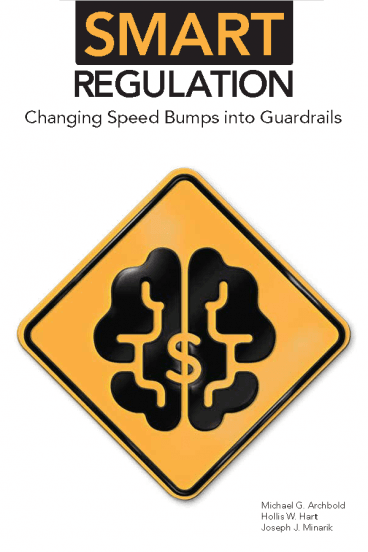Smart Regulation: Changing Speed Bumps into Guardrails

- Authors:
-
Publication Date:
June 16, 2019
Regulation is among the most controversial public policy issues today. Some Americans decry what they see as weak and insufficient regulation, while others see excessive regulation that stifles economic growth. The thorough analysis in this volume draws more nuanced conclusions. Our regulatory system is generating questionable new rules and ignoring the failings of old ones. Inefficient regulation can be a roadblock to job creation and growth of economic output and incomes, while poorly directed regulation sometimes leaves the public at risk. The authors provide lessons from the latest scholarship and from hands-on business experience to identify improved and superior practices, including some already in use around the world. They take focused looks at new and changing issues such as the Internet, financial services, and energy. Their conclusions point the way toward smart regulation, which holds far greater promise than simply more or less regulation. Endorsements from Business and Policy Leaders: "Books about regulation can make your eyes glaze over, but not this one. Written in a clear, concise and informed fashion, the authors of Smart Regulation lay out a sensible path for reforming one of the most important tools of public policy. It is a path that has room for elected officials and voters in both parties, a rare thing these days. For that reason alone, read this book!" —ROBERT LITAN, non-resident Senior Fellow, the Brookings Institution, member of CED’s advisory board, and co-author (with William Nordhaus) of Reforming Federal Regulation (Yale Press, 1983) "With the increasing speed of technological advancement and the explosion of real-time data, the CED authors’ call for data-driven, principle-based regulation is both timely and urgently needed. As they thoughtfully argue in Smart Regulation, there is a ditch on either side of the regulation road and smart regulations with clearly defined benefit-cost analysis are needed as guardrails. Whether you are most concerned with the environment or competitive markets, Smart Regulation is an excellent blueprint for a non-partisan dialogue on designing and maintaining regulations that create positive social and economic outcomes." —MIKE MONAHAN, Retired COO - Pitney Bowes Inc., Trustee, CEDTopics Covered Include:
- CREATE AN ACCOUNT SIGN IN
-
Only available to members. Become a member.







.png)




